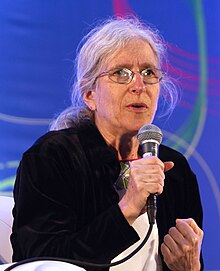Aviva Chomsky
American historian
Aviva Chomsky (born April 20, 1957) is an American teacher, historian, author, and activist. She is a professor of history and the Coordinator of Latin American, Latino and Caribbean Studies at Salem State University in Massachusetts. She previously taught at Bates College in Maine and was a research associate at Harvard University, where she specialized in Caribbean and Latin American history.

Quotes edit
Is Science Enough?: Forty Critical Questions About Climate Justice (2022) edit
- We are facing a climate catastrophe...The discourse might be going in the right direction, but our actions are going in, decidedly, the wrong direction. (page xi)
- Confronting climate change means understanding how we got to this point, and challenging some of the basic ways our society and economy are organized. (page xvii)
- We need to change our economy and our politics if we want to shift to a low-emissions society-our economy because we need to create a system of production that prioritizes human needs rather than increasing consumption, and our politics, because to make this change, we need to take control from a corporate system that has every interest in perpetuating itself. (page 30)
- Justice matters for its own sake, but I've tried to show here that social, racial, and economic injustice are tightly bound with the history and institutions that have led us to the brink of climate disaster. Our world continues to be shaped by ideologies and practices of progress rooted in Europe's colonial expansion and exploitation of the resources and labor of people of color in Africa, Asia, and the Americas. Europeans destroyed traditional lifeways and displaced, dispossessed, and enslaved people of color in their drive to build a new industrialized world based on ever-intensifying extraction of the planet's resources. (page 139)
- We need to bring issues together because we need to bring people together to build the power necessary to create change. (page 140)
- We need to understand the system in order to change it. (page 140)
- The framework of the Green New Deal gives us some radical, concrete, aspirational, yet achievable goals to fight for. A degrowth approach can liberate us to imagine a different, low-carbon, more just, and better world. (page 179)
- It is especially youth worldwide who are proving willing to acknowledge and mobilize for the kind of deep structural change that we need. Like the inhabitants of Third World countries and especially small island nations, they know that they are, and will be, the victims of others' policies and insouciance. (page 179)
- Climate justice means recognizing climate change as a moral, political, and economic issue that requires fundamentally reorganizing our global society and economy, not just a question of tweaking incentives and adding technologies. (p 180)
- The world's most powerful governments and corporations will not act if they are not pressured from below. (p 181)
- The failure of several decades of top-down reforms, from the Kyoto Protocol of 1997 through the Paris Agreement of 2015, to make any serious dent in our ever-increasing global emissions should be evidence enough that our current institutions are not capable, on their own, of imagining or enacting the kind of changes we need. (p 184)
- It's hard to mobilize to fight without a vision of the kind of social change you want, and when you have that vision, it's hard not to mobilize to bring it about. The proposals put forth by the degrowth movement, the buen vivir movement, and the Green New Deal for Europe for an economic slowdown predicated on redistribution and social justice have begun to make that alternative vision much more concrete. Youth, and communities on the front lines, already experiencing the ravages of the warming climate, are bringing increasing popular and political urgency to the dire warnings of scientists. (page 185)